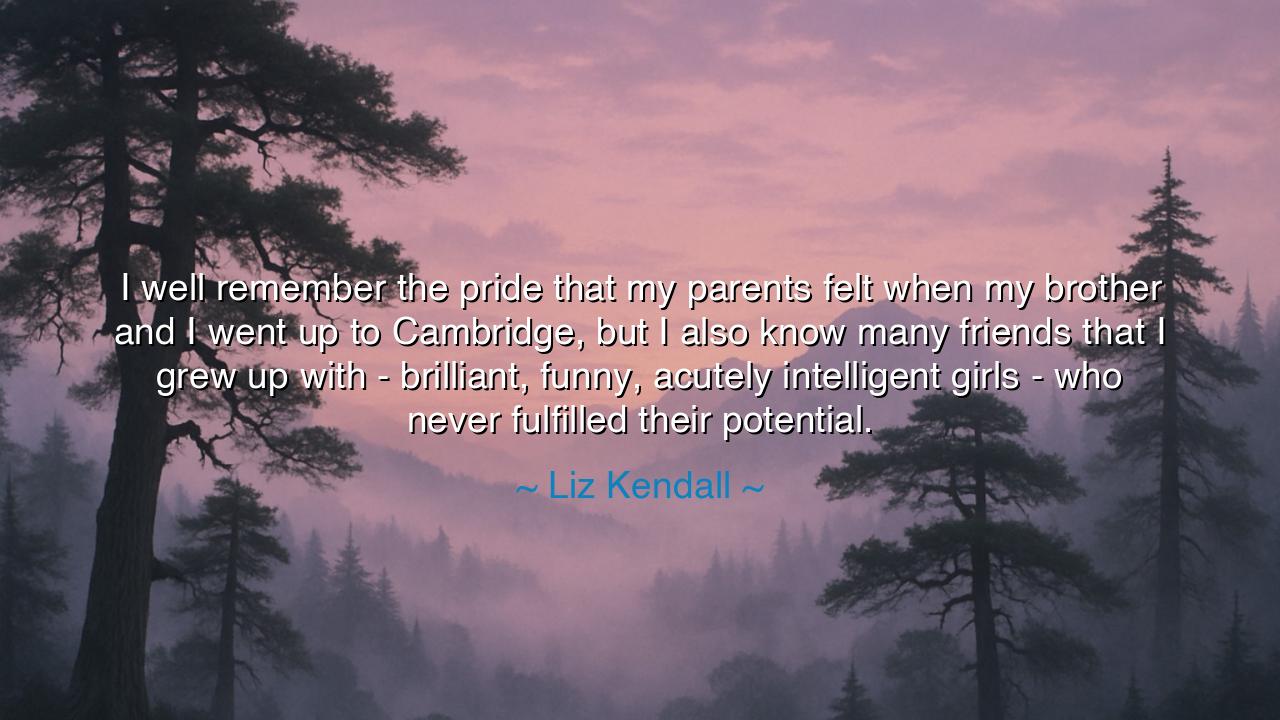
I well remember the pride that my parents felt when my brother
I well remember the pride that my parents felt when my brother and I went up to Cambridge, but I also know many friends that I grew up with - brilliant, funny, acutely intelligent girls - who never fulfilled their potential.






The words of Liz Kendall speak not merely of memory, but of injustice woven in quiet places, of the silent ache that lingers when potential lies fallow. She recalls the pride of her parents — that sacred fire all mothers and fathers feel when their children ascend to the lofty halls of learning, in this case, to Cambridge, that ancient seat of knowledge. Yet even as she remembers that joy, her heart is pierced by the memory of those brilliant, funny, acutely intelligent girls who, though born with equal gifts, were denied the paths their minds deserved to tread. In this dual remembrance lies both triumph and sorrow, the eternal dance of human progress shadowed by the ghosts of opportunity lost.
For in every age, there are those who rise — not solely by merit, but by circumstance, by the open or closed gates of their time. The ancients, too, knew this bitter truth. Recall the tale of Hypatia of Alexandria, the philosopher of light whose wisdom shone brighter than the stars of Egypt’s night. She gathered students from distant lands, teaching them geometry and the mysteries of the cosmos. Yet her brilliance, though pure, was not shield enough against the envy and fear of men. Her mind was vast, her potential boundless — yet it was silenced by those who could not bear to see a woman stand among the immortal thinkers. Thus, even as Kendall’s words echo from a modern tongue, they carry the same lament that has haunted the ages: genius unfulfilled is a wound to the world.
There is heroism in remembering, for memory itself is a form of rebellion. When we speak the names of those who could not ascend, we deny their erasure. We say to the world: these souls existed, they shone, and their light deserved to burn longer. Kendall’s reflection is not mere nostalgia; it is a summons. It calls to each generation to look upon the invisible barriers — class, gender, expectation — and ask, who among us is being quietly left behind? For every scholar who climbs the tower, there may be another, equally worthy, standing in the shadow of its gate.
Let us not think the world is healed simply because we have learned to name our injustices. Naming is but the beginning. The action of wisdom lies in breaking the old patterns, in ensuring that the measure of a soul’s worth is not bound by where it is born, whom it pleases, or what it looks like. Consider the story of Malala Yousafzai, who as a young girl refused to surrender her right to education. When struck down by those who feared her voice, she rose again — and spoke for millions. In her defiance, we see the fulfillment of all those acutely intelligent girls who once were told to be silent. Her courage is the flowering of what was once buried.
And yet, even as we honor the brave and the fortunate, we must turn our gaze inward. For the words of Liz Kendall are not merely about others; they challenge us personally. Have we not, each of us, known someone radiant with promise, who dimmed their own light for fear of the world’s disapproval? Or worse, have we been that person — gifted, yet hesitant to claim our rightful space in the sun? The ancients would call such hesitation a tragedy of the spirit. The Greeks named it hamartia — the flaw that prevents greatness from unfolding. To ignore one’s potential, or that of another, is to betray the divine spark placed within.
The lesson, then, is both personal and universal. Let us honor those who never fulfilled their potential not with mourning alone, but with resolve. Let us strive to create a world where brilliance, in whatever form it takes, is given room to grow. The fields of wisdom should not be gated gardens for the privileged few, but open meadows where all minds may run free. For each mind awakened lifts the rest of humanity a little higher.
And so, O listener, if these words find you at the edge of doubt, remember this: the pride of others may fade, the applause may cease, but the pursuit of one’s true potential is eternal. Seek knowledge with the hunger of the ancients; lift others as you climb; and never, never let the light of another go unseen. In doing so, you become the living answer to Kendall’s lament — the fulfillment of a promise whispered across generations.






AAdministratorAdministrator
Welcome, honored guests. Please leave a comment, we will respond soon